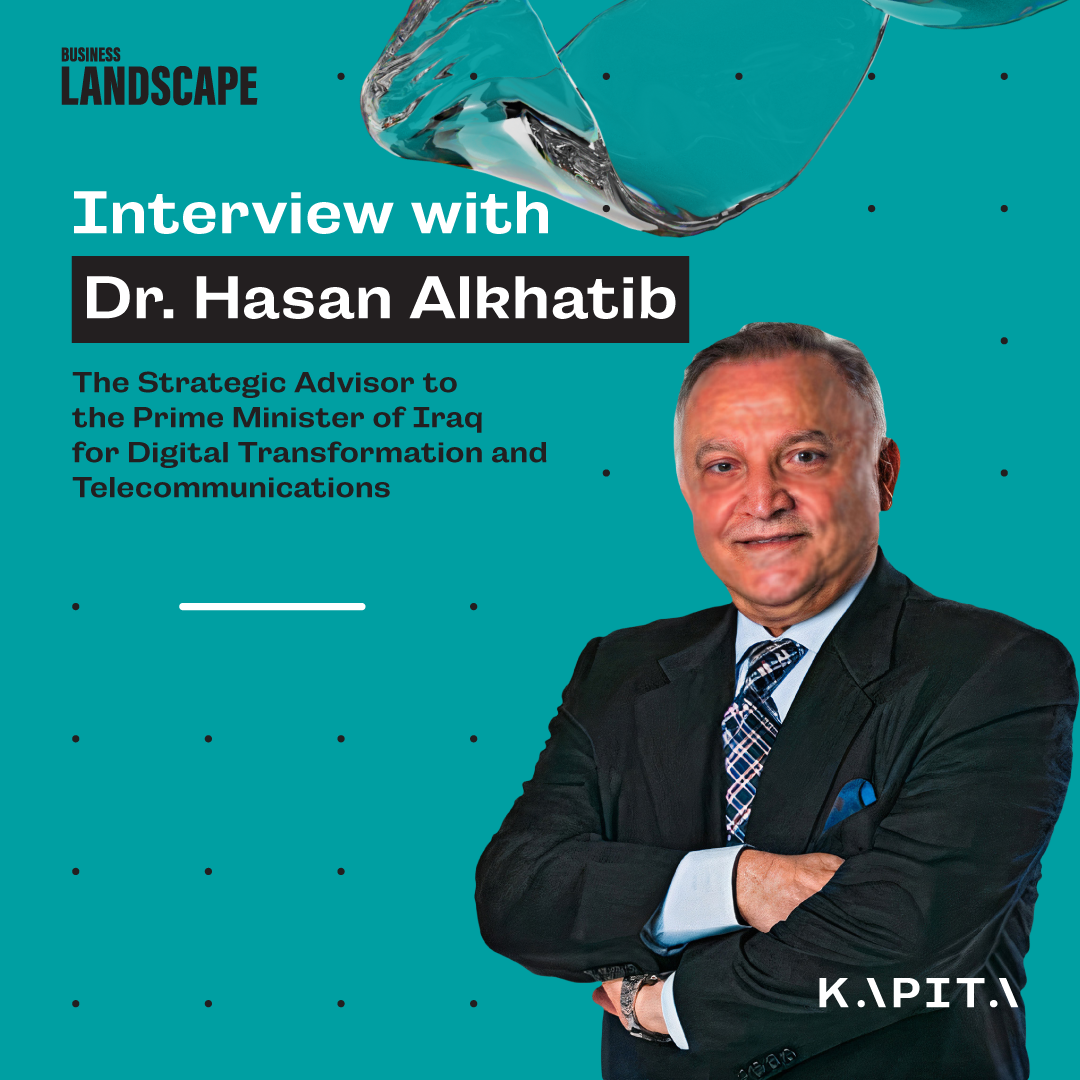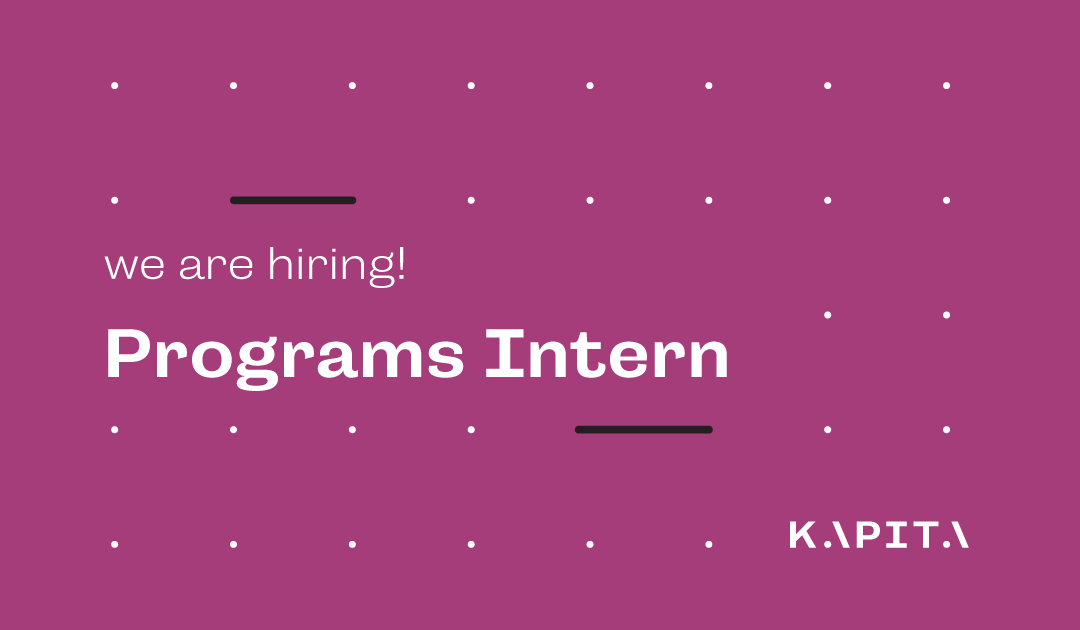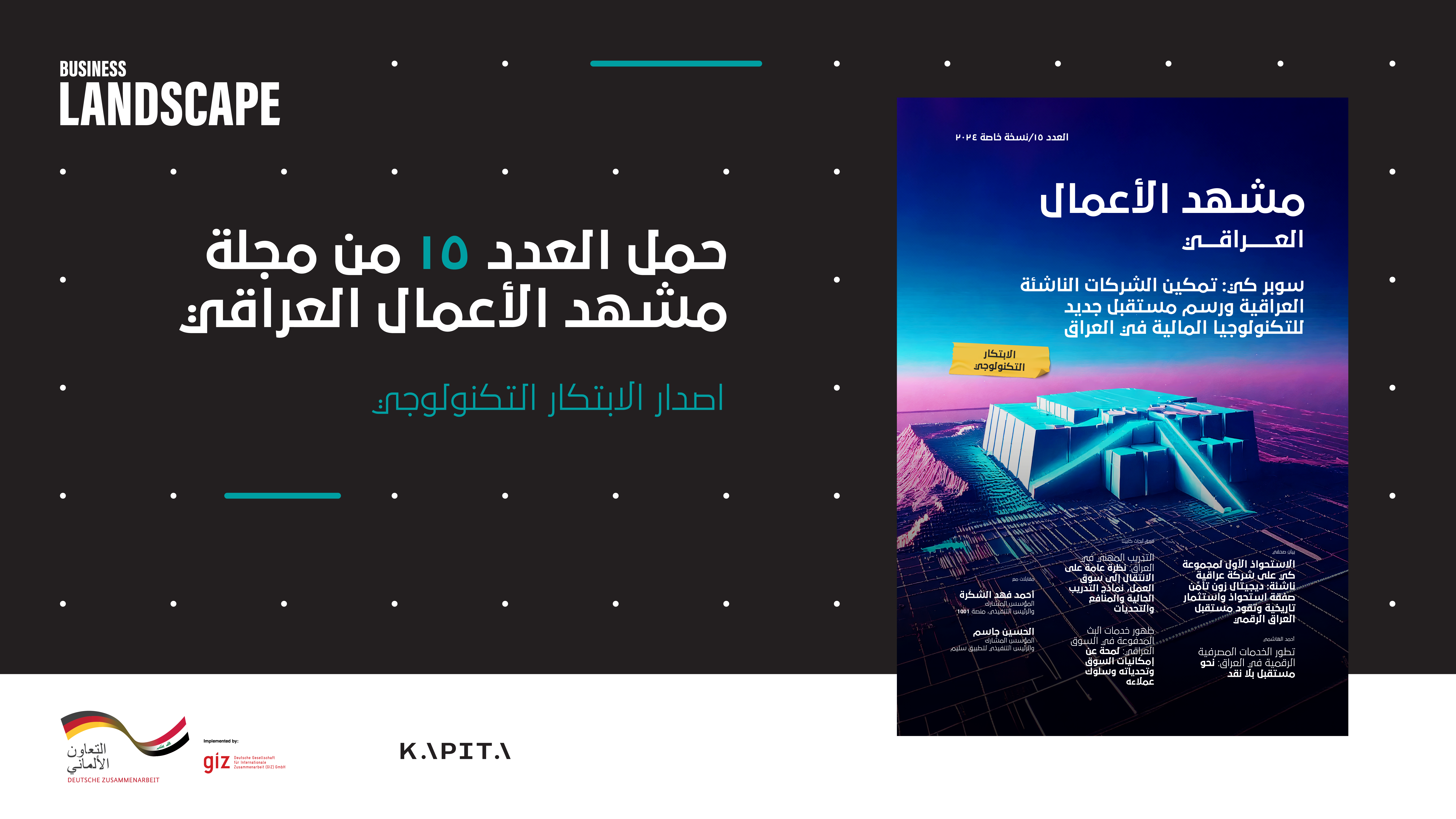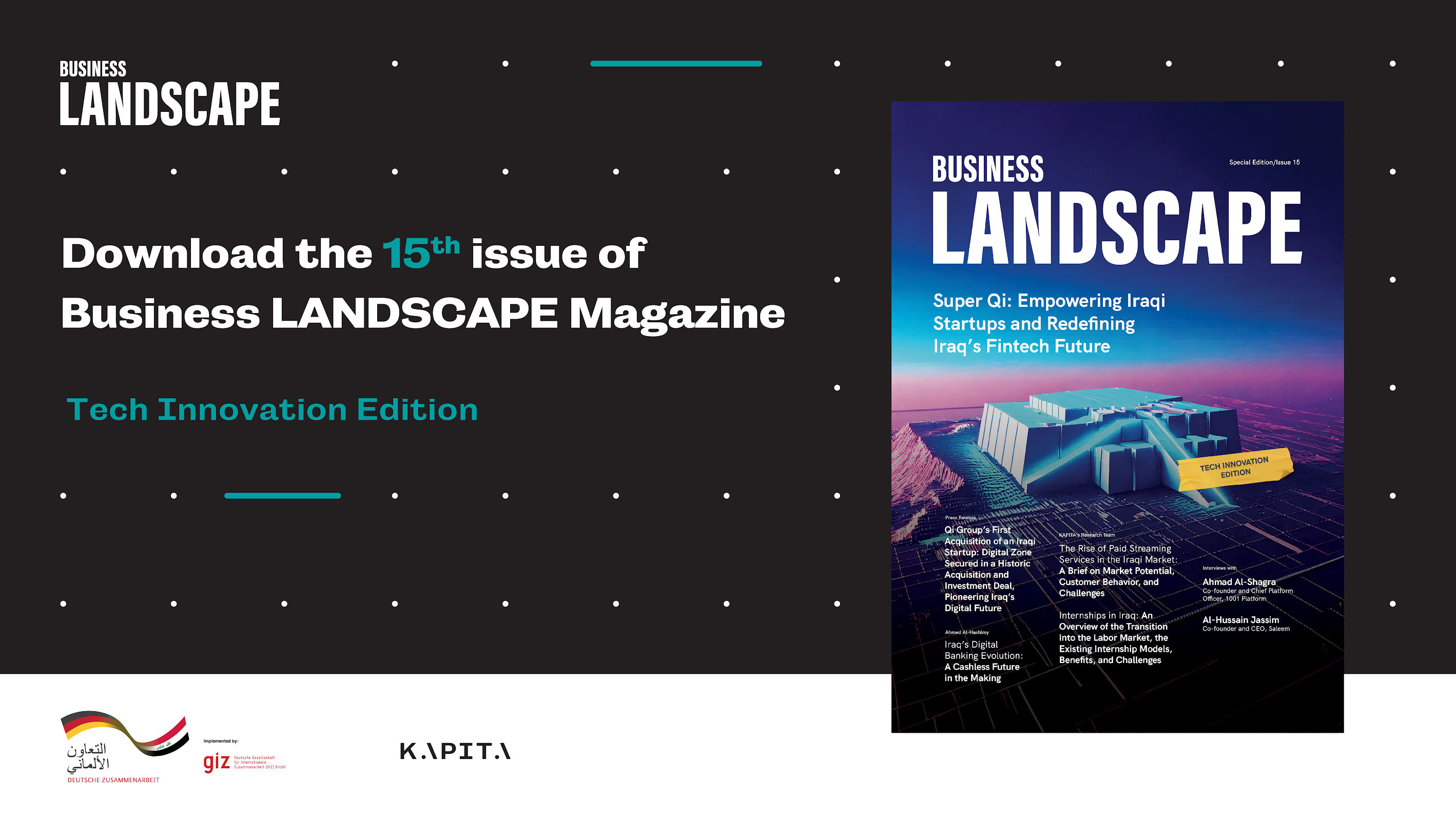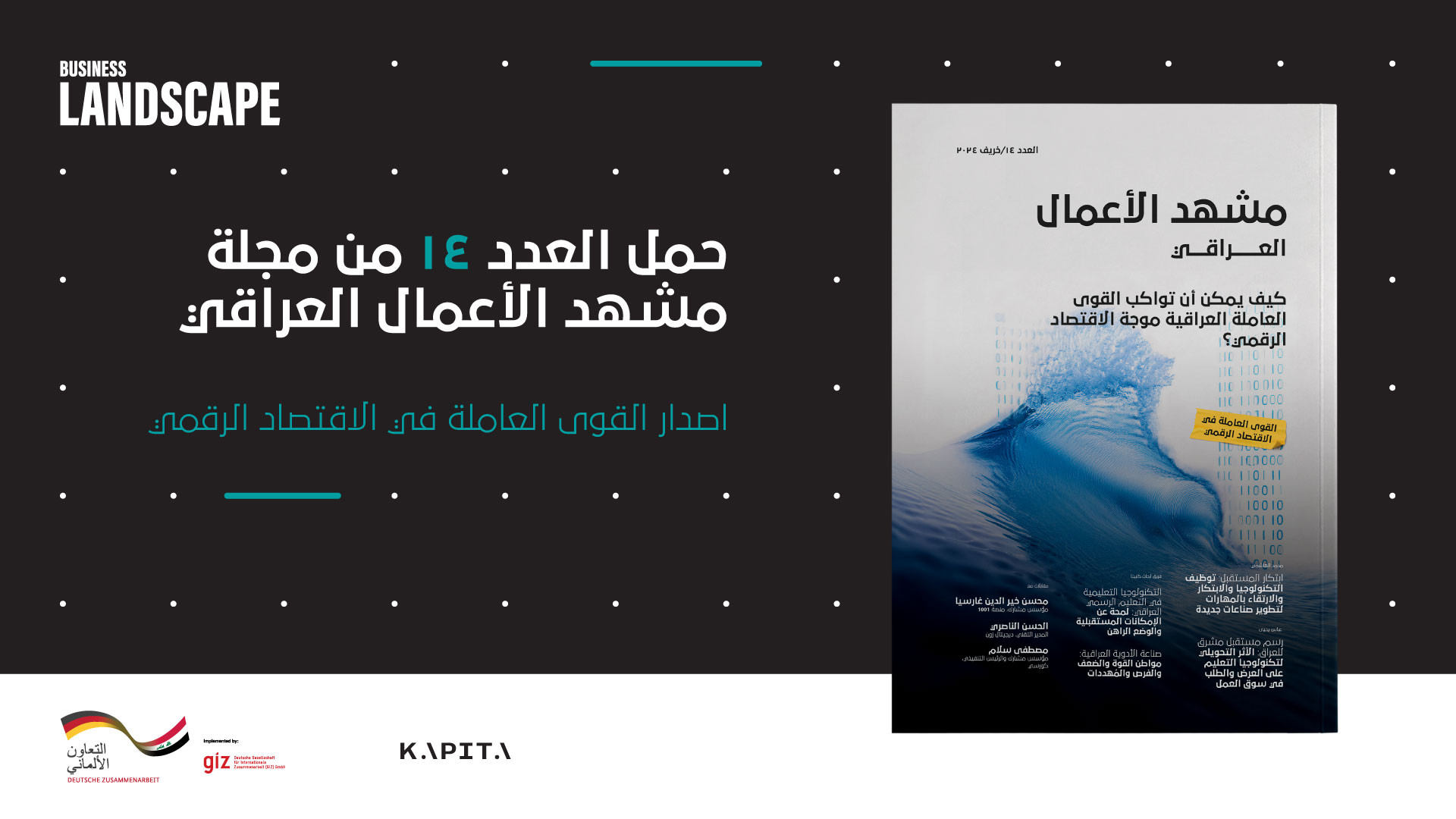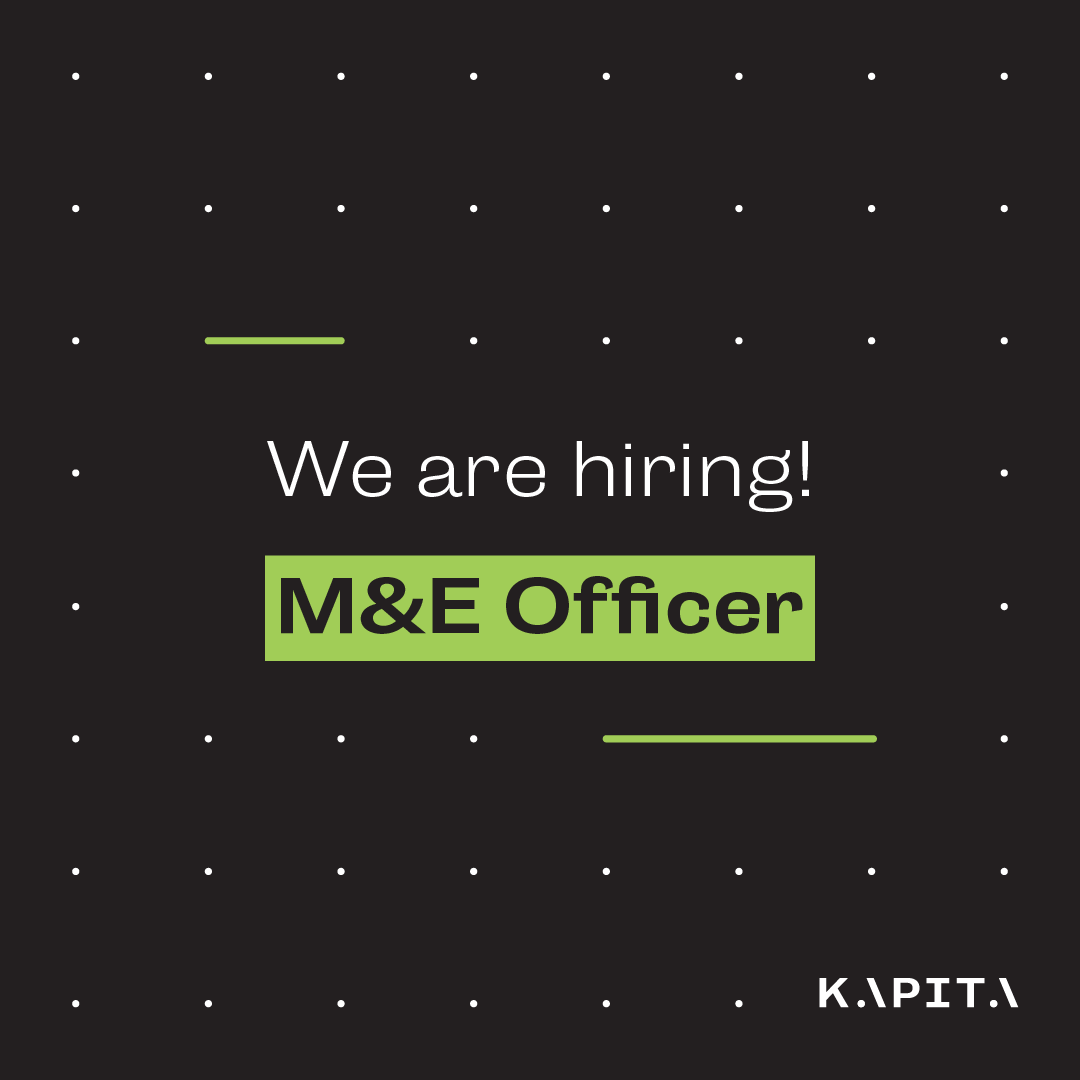Business LANDSCAPE Magazine Interview
Dr. Hassan Alkhatib
The Strategic Advisor to the Prime Minister of Iraq for Digital Transformation and Telecommunications
Dr. Hassan Alkhatib is the Advisor to the Prime Minister of Iraq for on technology infrastructure, projects, and digital transformation initiatives for Iraq, bringing decades of experience in communication and technology to his role. Dr. Alkhatib has held significant positions in academia as a professor at Santa Clara University in California and in the corporate world as a General Manager at Microsoft Corporation, where he played an essential role in the development of Microsoft Azure. His expertise extends to Iraq, where he served as an advisor to Qi Card Company and as an advisor to the Minister of Communications.
In this exclusive interview, Dr. Alkhatib delves into Iraq’s digital transformation initiatives, from the Oracle Cloud, the expansion of the National Data Center, the Government Mall, and Digital Academy to the National Switch. He emphasizes the role of the Iraq Development Fund in fostering a favorable investment environment and elaborates on the methodology employed for its implementation. Furthermore, he provides insights into the diverse array of initiatives to lay the groundwork for digital advancement and enhance electronic services across governmental institutions, paving the way for Iraq’s digital transformation.
Could we start with a brief introduction about you?
I graduated from Baghdad University in 1975, where I studied Electrical Engineering. In the following year, I traveled to the US on a scholarship to pursue higher studies. I completed my Master's degree at the Illinois Institute of Technology and then pursued a Ph.D. at The University of California. I started teaching at Santa Clara University in 1981, which was in the heart of Silicon Valley, California. This allowed me to work with tech giants and stay informed about technological developments. Technology was in its infancy at that time, and the personal computer (PC) was a new technology.
Due to the university's status, the International Business Machines Corporation (IBM) donated computers to faculty and university laboratories. My presence in Silicon Valley always supported my ambition to contribute something significant to the world of technology. By the end of 1997, I had the opportunity to develop a solution to one of the Internet problems of that time, which was related to the Internet protocol version 4 (IPv4) for communication between two or more computers via the Internet.
In 1997, I was one of the organizers of a conference on high-performance networks at
Stanford University, called Hot Interconnects Symposium. During a tutorial presenting the Internet Protocol version 6 (IPv6), I realized that the new design would not gain wide adoption due to the lack of economic incentives for the entity that is required to make the upgrade from IPv4 to IPv6. Until today, IPv6 has not seen the wide adoption needed to overcome that specific problem. The use of IPv6 in Iraq is very limited, if any. That led to the first patent that I obtained in 1997, which was about extending the usage period of IPv4 to provide a window of time for those unable to convert to IPv6. Today, I have 74 patents, the majority of which I obtained during my tenure at Microsoft (2007-2011).
In 1992, I established a consulting company and worked closely with Silicon Valley Startups and large companies. Thus, in 1998, I transformed my consulting company into a software product company called IP Dynamics. Empowered by my important invention, I raised funding for IP Dynamics and was able to attract many investors. The seed investor was none other than one of my students in 1982 and 1983, Patrick Gelsinger, who today is the CEO of the microprocessor chip giant Intel Corporation.
In 2007, I had to sell IP Dynamics to Microsoft, while I was hired as an executive there and then I became General Manager of Microsoft’s Enterprise Networking Group, overseeing products related to enterprise networking and network security. One year later, I became the Chief Architect of Networking and Network Security of Windows Azure, Microsoft’s flagship for their cloud computing platform. That continued until 2011. Then, I decided to leave Microsoft and return to Silicon Valley, driven by the desire to establish another startup that was focused on developing an interactive learning system.
I visited Iraq in 2013 for less than a week when I met the founder and CEO of International Smart Card (ISC), which single-handedly had successfully created the e-payment market in Iraq through its QiCard e-payment scheme and offered it to Rafidain and Rasheed banks. I was impressed so much that I agreed to become the technical advisor to the company and its founder, Bahaa Abdul Hadi. I then established a technology subsidiary for ISC in Dubai in 2014, which I ran until 2017.
In 2019, I returned to Iraq to become the advisor to the Minister of Communications. During this period, I gained extensive and deep insight into the state of the telecommunications network in Iraq and its challenges. In the meantime, I was nominated to become Minister of Communications in the first cabinet of Prime Minister Mustafa al Kadhimi. Currently, I am the advisor to Prime Minister Mohammed Shia al Sudani for digital transformation and telecommunications.
Can we learn more about the Iraq Development Fund and how it will contribute to supporting Iraq’s technology infrastructure and digital initiatives?
Iraq Development Fund was created to provide seed investments ranging from 5% to 10% and a purchase/lease guarantee for business initiatives to grow Iraq’s economy. It invites investors from around the world, with an additional focus on Iraqi investors. Investors are invited to invest in projects designed to boost the Iraqi economy in six sectors: digital transformation, education, housing, agriculture, manufacturing, and climate change.
In addition to seed investments, the Iraqi Development Fund will be a guarantor for investors on their investments in Iraq by guaranteeing the purchase or lease of their products and services when completed. This will eliminate the risk by providing the equivalent of a sovereign guarantee. In this case, the Iraq Development Fund, the investor, and the entrepreneur or specialized company in a particular field are identified. This partnership may evolve into a public-private partnership or private ownership. In other words, it may involve state ownership or only a private sector, but ultimately, it will provide the services Iraq needs. This is the general formula in financial, commercial, and business terms and agreements.
A government entity such as a ministry may enter into it for several reasons, either having an interest in the outcome or possessing assets. For example, one of the major projects that will be launched is transforming state services from manual and paper-based to electronic services (generally referred to as e-government services). For instance, the process of transferring real estate property ownership today is lengthy and tedious. The automation operations currently happening only cover the front end of the automation process; in other words, a citizen submits a service request with all required documents electronically via the internet. When the application reaches the respective government department, it is printed and processed manually, as the manual process behind the scenes is not yet fully automated. It is an incomplete automation process. We will build the front end, the middleware (business logic), and the back end, which is where the data is stored. This will build our actual data repositories in various sectors. The automation will be 360 degrees, covering the entire citizen service cycle.
Unfortunately, there is a lot of public debate about cybersecurity, but the issue is that we do not have actual data, and the available ones are often public. It is like securing your home, yet you do not have any valuable assets to protect.
What do you believe are the cornerstones for digital transformation in Iraq?
The state of digitalization in Iraq is like any other sector, such as agriculture or manufacturing—its foundation is knowledge, which often is lacking. Iraq cannot develop without a modern educational system. This includes science and technology at every level of education. Moreover, Iraq needs infrastructure to enable the employment of technology to increase the productivity of its economic engine. Infrastructure includes computing data centers to run the applications, store the data, and make the latter available for processing and sharing; computers in the hands of people in every sector and the applications that they need to use to achieve accelerated outcomes in their sector; plus, the high bandwidth and reliable data communication networks to enable communication and interaction. Digitalization also requires broadly functional automated banking and payment systems.
What steps will be taken to advance Iraq's technology infrastructure?
We have put together six major complementary initiatives to transform Iraq into a digital society, both in the public and private sectors.
Our first initiative that we intend to complete by the end of this year is to establish cloud-based data centers using Oracle Cloud in Baghdad and other governorates. Oracle
is the second-largest computer company in the world. The Iraqi Fund for Development (IFD) has taken the initiative to back this project. It is leading in the formation of a Special Purpose Vehicle, SPV, to create a consortium of partners led by the private sector with potential participation of government entities and ultimately enabling the public to buy shares in the resulting company.
Oracle will bring its own team to build these data centers. We plan initially to start with two centers, one in Baghdad and one in Erbil. The estimated cost will be hundreds of millions of dollars. This decision will pave the way for numerous opportunities for other American technology companies to come to Iraq.
When I founded my company in 1998, there were over 60 venture capital funds in Silicon Valley that funded emerging companies like Intel, Google, Facebook, Yahoo, and many others. The financial return from these startups was very high due to their innovation and success. The same applies to the IFD, which will contribute significantly and effectively to the development of opportunities and ideas by supporting and encouraging investors to enter the Iraqi market. These projects will certainly contribute to the development and growth of the Iraqi economy by expanding the private sector. Additionally, it will contribute to channeling the interest of employment from the public sector to the private sector.
Cloud computing encompasses more than just the hardware and software that operate it. It also includes the software responsible for managing the applications running on the hardware, often
referred to as coordination software or the orchestrator.
Today, if a workflow operates on a single machine, it is termed a monolithic application. To execute it, you must run it on a single server. On the other hand, there are applications named cloud-ready applications, which are designed to operate on one server but are capable of being deployed and utilized across many servers simultaneously. Therefore, instead of being confined to a single large server, they operate across multiple servers. This concept is known as scale-out as opposed to scale-up. Many people in Iraq refer to any data center as cloud-based, yet real cloud technology has not yet entered Iraq.
These concepts emerged with clouding technology, and the pioneer in this was Amazon, which deserves credit for Amazon Web Services (AWS). Today, Amazon is considered a leader in this field and in the adoption of such technology. However, the system we developed at Microsoft remains the best. Twenty years ago, management in machines was called virtual machines, where you have a physical server that you divide into multiple virtual machines through software. This allows us to run multiple applications. These technologies have evolved over the past 10 years. They have developed significantly for higher efficiencies in running more applications on the infrastructure. Virtual partitioning is not at the machine level but at the level of a single application or a group of interrelated applications.
The price-performance trade off in employing such technologies using cloud computing can exceed 10 to 1, relative to traditional data centers.
How would you transition government services to be electronic-based? And what benefit would this create?
Our second initiative is the introduction of e-government services, transitioning from paper-based to electronic. We are cooperating with the Ministry of Communications, particularly with the Iraq Post. The project is also led by IFD in a similar manner to the cloud-based data centers project. The Ministry of Communications, through its Postal Service, owns 268 post centers in Iraq. These centers will be rehabilitated into the "Mall of the Government," a one-stop shop for government e-services. The first phase will include 22 centers covering all of Iraq. Investors will rehabilitate these centers to provide not only postal services but also government e-services like the property transfer services example I gave earlier, through a specialized team that helps citizens by verifying their documents before submission. Citizens can submit their application for a particular service and wait at the center until their application is processed and completed. These front-end e-government services will reduce the time and effort spent on travel and paperwork for citizens.
We will follow the agile methodology to achieve our overall goal. Therefore, the middleware and the back end of each service will be developed too, and the operations team responsible for that service will be trained completely on operating their automated new service, so that we achieve 360-degree automation.
Iraq offers around 1,200 services. To digitize these services, we need billions of dollars and up to 5 years of work to achieve that. Agile methodology is a successful and practical approach, which translates to implementing one project at a time. In the case of the Government Mall, the private sector is responsible for providing the service for a certain fee paid by the user in coordination with IFD. Therefore, I consider this fund one of the best initiatives by the Iraqi Government so far. On the other hand, the government staff responsible for completing the respective e-service, such as the property transfer operations example at the Ministry of Justice will enter a Digital Academy, which provides training, exams, and certificates. This will help qualify and develop the staff and encourage others as well.
I am not an advocate of imposing mandates. Instead, I look for ways to raise interest and enthusiasm for people to adopt the initiatives and pursue the training. The property transfer project may require three months to accomplish.
The next question is, who will carry out the automation process? The answer is that many automation companies are present in the Iraqi market, and many new companies will emerge, creating many well-paying jobs. Consequently, every three months or so, we accomplish a set of services delivered to Iraqi citizens, of which the Ministry of Communications may be next. Within a year and a half, we expect to complete 90% of the e-services projects. The automation of these services will be hosted on the Oracle Cloud.
We have a third initiative to spread the use of technology and innovation among Iraqi citizens by deploying Smart City services in coordination with local municipalities and private sector investors.
Our fourth initiative concerns the National Data Center (NDC). The National Data Center is a great step forward so far. We propose to transform it into the "National Digital Transactions Center," which not only deals with data but also provides application services in the form of Software as a Service (SaaS).
The first application everyone needs in government is email, which will allow employees to communicate electronically in a professional way with each other and share documents. But before they do that, they need tools to create such documents and manage them. The expanded NDC can run these applications as a service. They include, for instance, the Microsoft Office 360 suite, plus a proper document management system, such as MS Sharepoint. The problem with that is the outdated computers and their operating systems.
There are about 750,000 computers in government offices, with an average age of 12 years, which means they are obsolete, and companies like Microsoft do not support them. More importantly, the programs run on these computers are obtained without proper licenses and are outdated. Government employees and the public need to get computers Microsoft has shown great interest in collaborating with the Iraqi government and offering large country-wide discounts.
Furthermore, the expansion of the NDC to the National Digital Transactions Center, which hosts
and provides applications as services for a certain fee, eliminating the need for other ministries to have large IT departments that repeat the same work. Moreover, we need to automate the work of state institutions such as accounting, human resource management, financial planning, or what is called Enterprise Resource Planning (ERP), as well as resource management that helps in solving the issues of state assets in various forms and categories in all government departments through material management applications. Many global companies such as Microsoft, Oracle, International Business Machines Corporation, and local companies have built such applications. We do not have to reinvent the wheel; we can benefit from the available technologies in the market and run it as a service using the SaaS model on the NDC cloud-based data center.
Can we learn more about the Digital Academy and how it will transform government services?
The Digital Academy represents our fifth initiative for the digital transformation of Iraq. Digital illiteracy is rampant in Iraq. We need to educate and train millions of Iraqis on computers and all the associated tools and applications and incorporate them into their daily lives, both at work and at home.
The Digital Academy is a virtual academy. We intend to create the specification of digital literacy programs, their ideal content, the knowledge bar to consider a level of education and training is completed (that is, the outcomes), the tests that must be administered to validate completion of a level, and the associated certificates that ought to be granted. The academy has to take into account all ages and roles in society.
We are developing these programs in cooperation with educational institutions in Iraq and the respective ministries so they can be incorporated into the curriculums from elementary schools to colleges. We are also cooperating with international organizations such as the UN, WFP, UNDP, and the German aid organization (GIZ). We will seek content from reputable companies like Microsoft, SAP, Huawei, Cisco, and Oracle.
This will help in qualifying and developing employees and will also encourage others. The content of this academy will consist of several training and educational stages, starting from how to operate a computer, working with Microsoft Office, and using emails. Many people need to gain skills in using communication programs. Digital illiteracy in Iraq is detrimental, and the way to solve it is through training and education. Therefore, the goal of the Digital Academy is to provide and develop basic digital skills all the way up to learn how to use human resource management tools and accounting tools as well as advanced topics like network configuration, implementing cybersecurity measures, and dealing with breaches; employing artificial intelligence to aid in automation, etc.
It is essential to emphasize that it is digital rather than a physical academy. Therefore, we must officially negotiate with these companies to provide training courses to millions of Iraqi employees at reasonable prices. We will invite the private sector to create digital education and training institutes that would use our program specifications, and we will work in cooperation with the ministries that provide education to establish a system of certifying these real institutes of training at each level.
Are there any initiatives targeting the banking sector in particular?
The sixth initiative revolves around Iraqi banks. There are about 80 banks in Iraq. Services like transferring money from one bank to another are still unavailable for the banks in Iraq because of the absence of the national interbank switch. Additionally, international money transfers are also not available easily. Despite technological advancements, the global banking system still uses the SWIFT system, which is primarily a secure communication system. The global banking sector is technologically conservative. SWIFT, for instance, is equivalent to using a fax machine to send a message when email is available. Technology is very advanced today. For example, Revolut Bank, which operates in 31 countries worldwide, provides instant money transfers from one country to another without the need for the SWIFT system.
The current national switch works for ATM machines of different banks but does not offer interbank money transfer services. Investors are willing and ready to build a national switch system to solve such a problem. This project is significant for the Iraqi economy, as the economy can only thrive with an effective and efficient banking system. We will lead the initiative of this effort with the Central Bank of Iraq and the cooperation of IFD.
